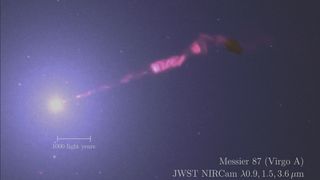Black holes: Facts, news, features and articles about the darkest objects in the universe
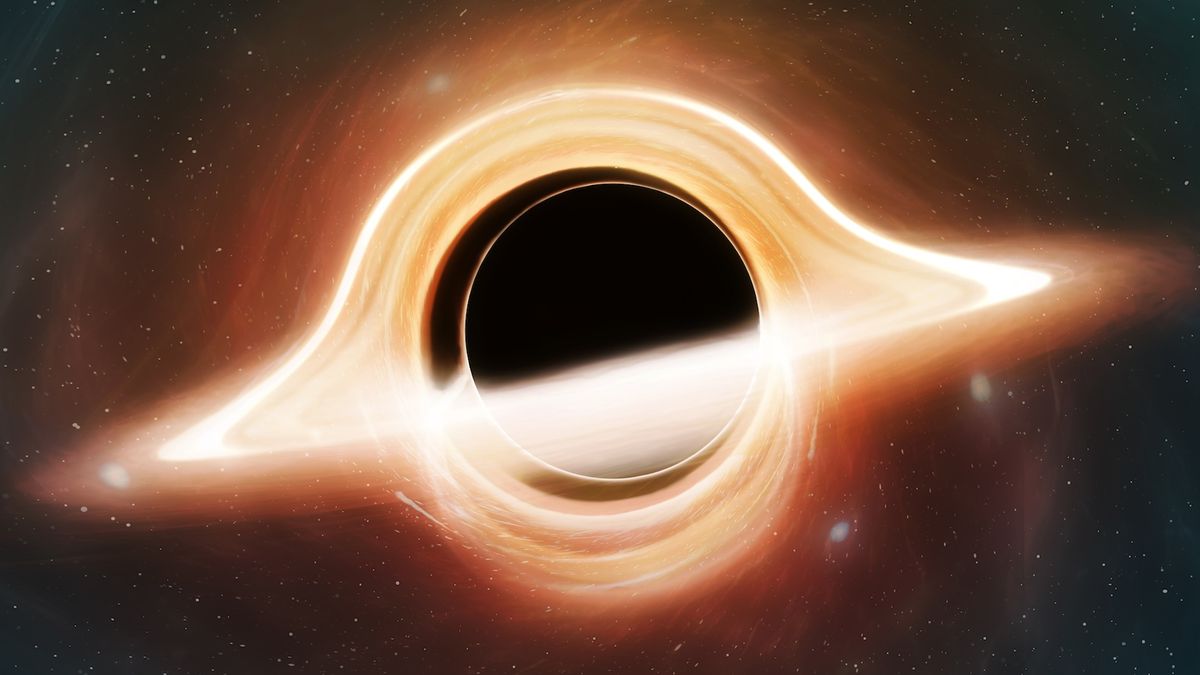
What they are: Places in space where gravity is so strong that nothing can escape
How they form: When a massive star collapses in on itself
Why they're black: Their gravitational pull is so extreme that even light can't escape
Black holes are places where gravity is so powerful that nothing — not even light — can escape. Rather than being empty, black holes are chock full of matter that gets squeezed into a teensy space.
The idea of black holes was first proposed in 1916, but at the time, physicists didn't think they actually existed. Today, we know that black holes are all around the universe, from far-away galaxies to the center of our own Milky Way.
Read on to discover everything you need to know about how black holes form, what it's like inside of a black hole and what would happen if you fell in one.
5 fast facts about black holes
- The closest black hole, Gaia BH1, is about 1,500 light-years away.
- The biggest known black hole is TON 618. It's 66 billion times more massive than the sun.
- A supermassive black hole called Sagittarius A* lies at the center of the Milky Way.
- The Milky Way may contain millions of black holes.
- Black holes are freezing cold. At their center, they can reach temperatures near absolute zero.
Everything you need to know about black holes
How do black holes form?
Black holes can form when a huge star dies. This happens because stars produce light and heat through a process called nuclear fusion. In this process, two small atoms fuse together to form a heavier atom, which releases energy. Those heavier atoms then fuse to form even heavier atoms, and so on to keep the star churning out light and heat.
When very big stars near the end of their lives, they fuse heavier and heavier atoms in their centers. Eventually, they start forming iron atoms. But fusing iron takes more energy than the reaction produces, so the star starts to collapse in on itself, forming a black hole.
Supermassive black holes are a special type of black hole that are millions of times bigger than our sun. Supermassive black holes form over hundreds of millions of years by both feeding on material around them and merging with other black holes.
There may be other black holes that formed right after the universe began. If they exist, they formed because soon after the Big Bang, there were pockets of space with so much matter squished in them that they collapsed and formed black holes. But scientists haven't yet found one of these "primordial" black holes yet.
What happens inside a black hole?
Black holes may look like empty space, but they're the opposite. Inside a black hole, you would find loads and loads of material squished down to an infinitely small point. This tiny yet extremely dense point is called a singularity. Physicists don't know what happens at the singularity. It's such an extreme environment that all of our current knowledge of physics breaks down, making them technically impossible. It may be that we just don’t fully understand them yet.
Surrounding that singularity is the event horizon, the invisible boundary that marks the entrance to the black hole. Once anything crosses the event horizon, it can never, ever leave. In order to escape, one would have to travel faster than the speed of light, which is also impossible.
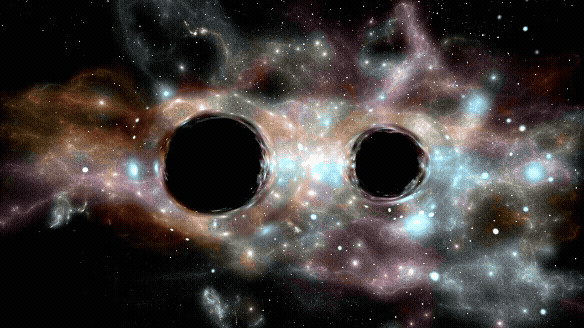
What do black holes look like?
Black holes are black because their gravitational pulls are so strong that even light can't escape them. Without any light coming from their centers, they look completely dark. But astronomers can still "see" black holes through other methods.
One way to detect black holes is through the quasars they produce. Quasars are very hot, bright objects that happen when black holes pull in gas and dust. The ring of dust and gas around the black hole glows brightly, making it easy for astronomers to spot them. Some quasars shine brighter than entire galaxies, and are visible billions of light-years across the universe. Another way to "see" black holes is when they merge. When two black holes collide, they send out ripples in space-time, kind of like waves on the ocean. These are known as gravitational waves. These waves are incredibly weak, but sensitive instruments on Earth can detect them. To date, astronomers have identified at least 50 black hole merger events.
The first true "image" of a black hole ever created came out in 2019, when astronomers used the Event Horizon telescope to snap an image of a lit-up disk of material swirling around a black hole called M87*. Weighing 3 billion times that of the sun and sitting in a galaxy over 50 million light-years away, M87* looked like a distorted orange donut. Since it's impossible to take a picture of the black hole itself (because no light can escape), what the astronomers instead saw was its "shadow," the hole in the glowing material surrounding it. In 2022, the same telescope took an image of the black hole at the center of the Milky Way.
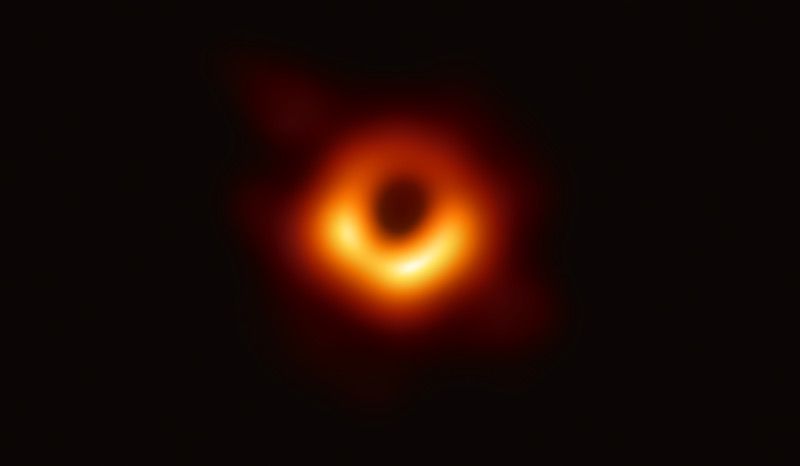
Who discovered black holes?
Physicist Karl Schwarzschild accidentally discovered black holes in 1916, when he was figuring out a particular solution to Einstein's general theory of relativity. But that solution contained a strange feature: the theory behaved strangely at a specific size, known today as the Schwarzschild radius.
It was later realized why this number was so special. If you compressed the mass of an object into a space smaller than the Schwarzschild radius, its gravitational pull would overwhelm every known force and nothing could escape. Early physicists assumed that other physical laws made this impossible. But in the late 1930s, it became clear that nature could indeed allow black holes to exist when Indian physicist Subrahmanyan Chandrasekhar found that above a certain density, no force can overwhelm gravity. However, black holes can only form under the most extreme conditions.
What would happen if you fell into a black hole?
If you fall into a black hole, death is guaranteed. As you approach a black hole, the gravitational forces are so strong that you would be stretched head-to-toe into a long, thin strand of particles before even reaching the event horizon, a terrible fate called "spaghettification."
Average size black holes would spaghettify you so fast your brain would rip apart into separate atoms instantly and you wouldn't have time to notice anything. But bigger black holes would take longer to spaghettify you. In that instance, you'd start going faster, approaching the speed of light. As that happened, time would slow down more and more. This would create a very weird effect, where when you looked into the black hole (if you were still alive), you'd see everything that happened in the past near that spot falling into it. If you looked behind you, you'd see everything that would happen in the future.
Black hole pictures
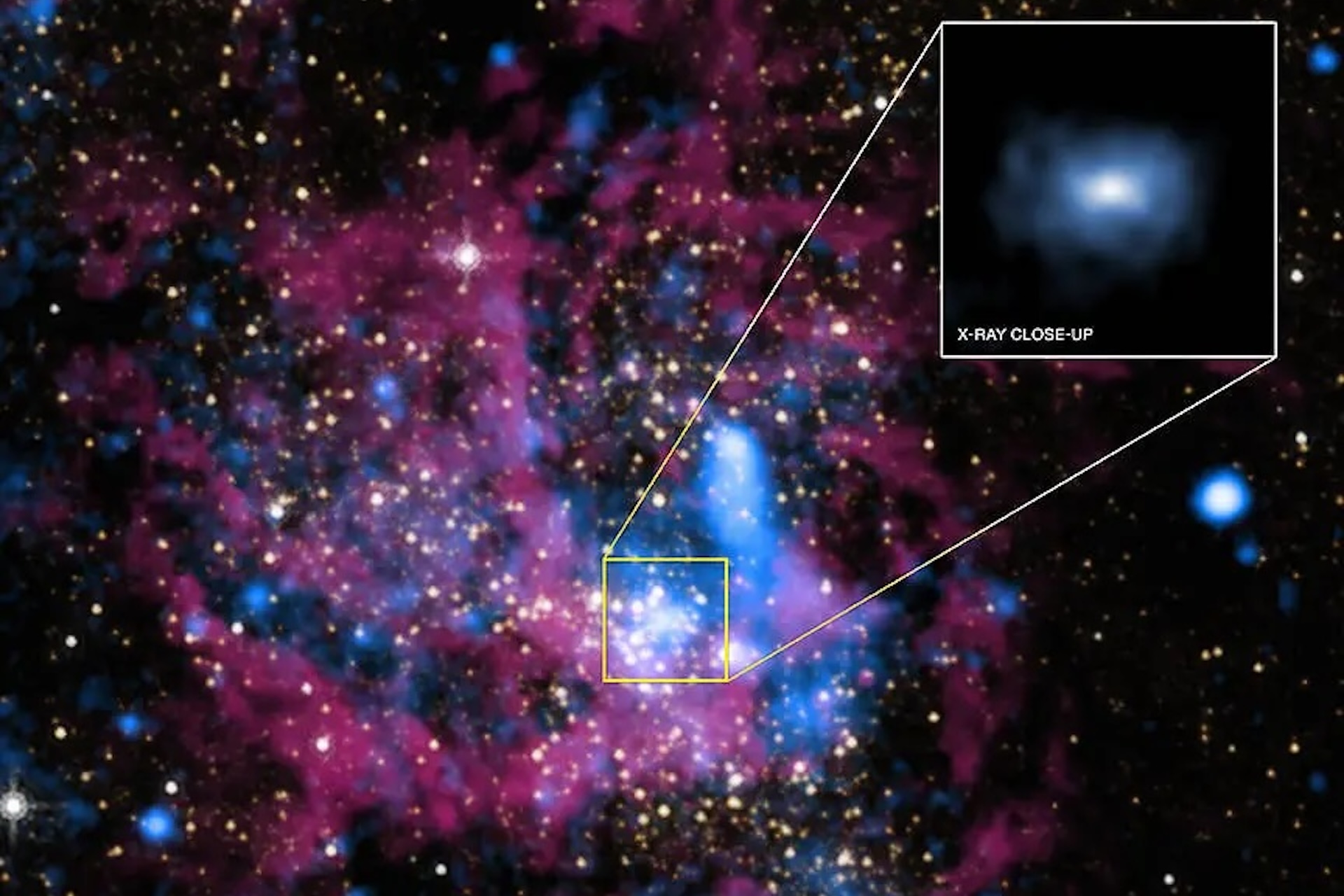
A black hole at the center of the Milky Way
Sagittarius A* is a supermassive black hole at the center of our Milky Way. Scientists believe most large galaxies have a supermassive black hole at their center.
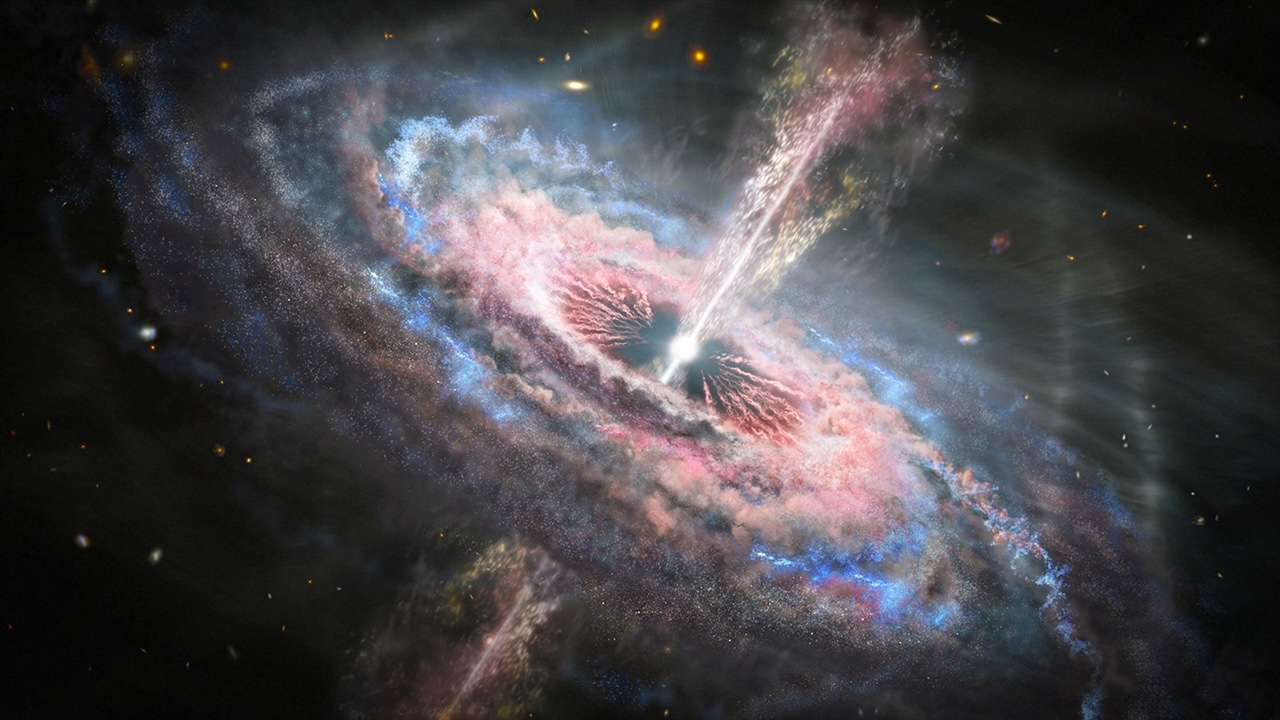
Quasars
Quasars are powerful bursts of energy released by black holes. Scientists can look for quasars to "see" black holes.
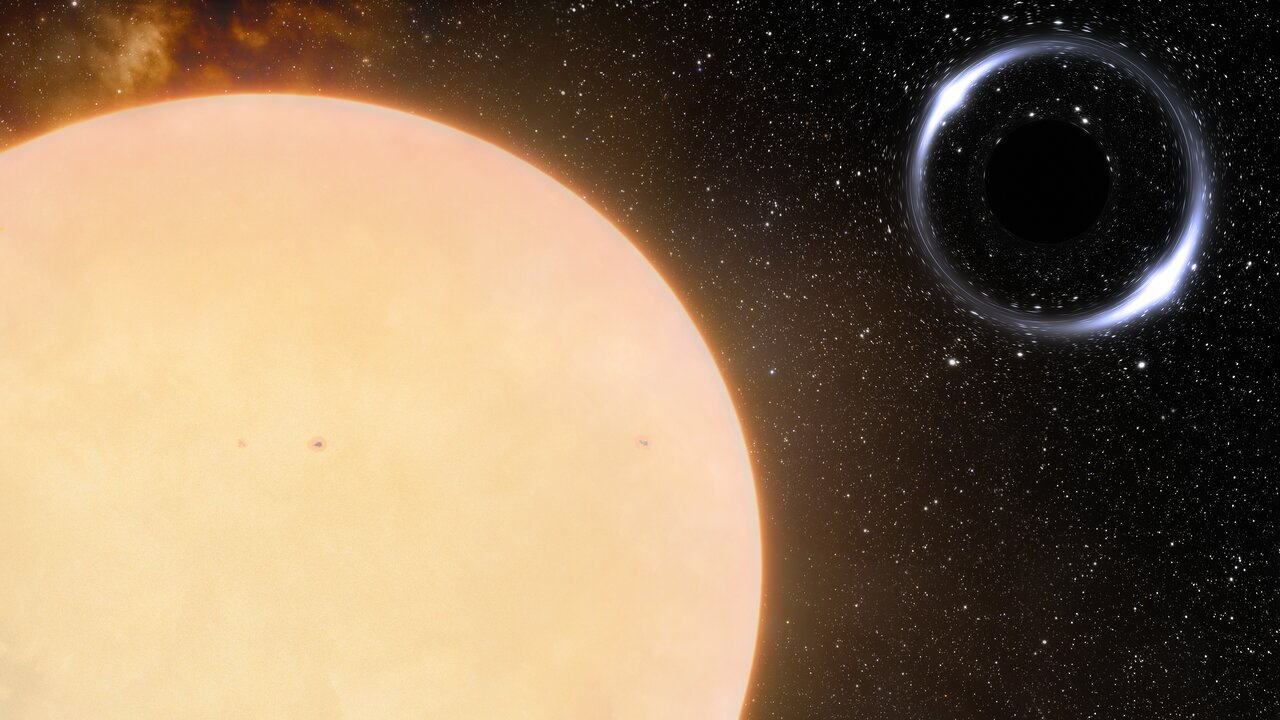
Our nearest black hole
Gaia BH1 is the closest black hole to Earth. In this illustration, it's shown with the sun-like star that it orbits.
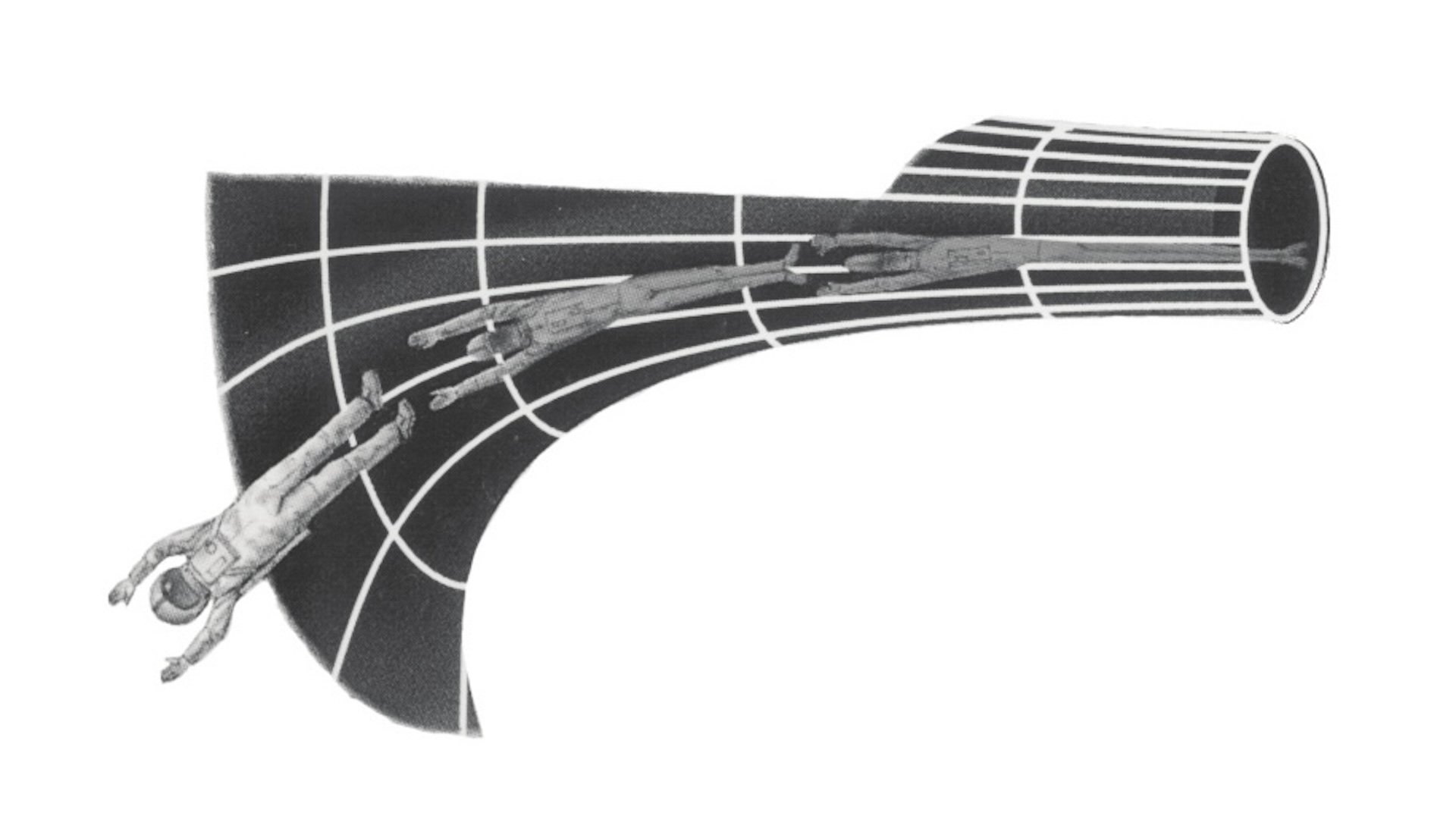
Spaghettification
If you fell into a black hole, your body would be stretched head-to-toe by the powerful gravity — a fate called "spaghettification".
Discover more about black holes
Latest about Black Holes
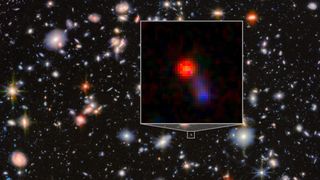
James Webb telescope finds supermassive black hole hidden inside 'Jekyll and Hyde' galaxy
By Patrick Pester published
The discovery of a hidden supermassive black hole inside an ancient galaxy suggests that some of our universe's most extreme objects could be invisible unless observed in infrared wavelengths, James Webb telescope observations reveal.
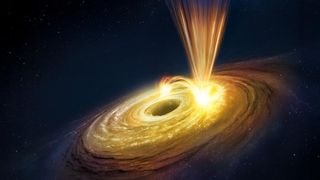
'A scale almost too big to imagine': Scientists spot monster black hole roaring with winds at more than 130 million mph
By Joanna Thompson published
A black hole 30 million times the mass of the sun has produced winds one-fifth the speed of light, stunning scientists.
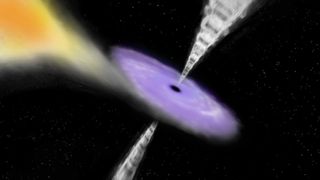
Scientists spot 2 black holes that took turns slaughtering 1 unlucky star
By Paul Sutter published
A strange X-ray signal spotted decades ago may be the result of a star that got attacked by two black holes, one after the other.
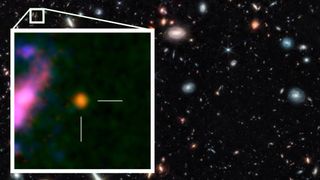
James Webb telescope may have discovered the earliest, most distant black hole ever seen
By Shreejaya Karantha published
The James Webb telescope may have detected the universe's earliest and most distant known black hole at the heart of galaxy GHZ2, revealing how the first black holes grew just a few hundred million years after the Big Bang.
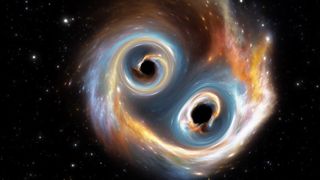
Record-breaking black hole collision finally explained
By Andrey Feldman published
In 2023, scientists detected the gravitational waves from a black hole collision that seemed impossible. New research finally explains how this "forbidden" black hole came to be, and what it can teach us about these extreme objects.
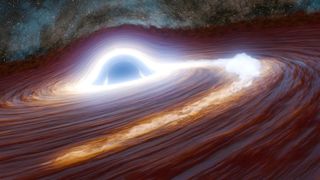
'Unlike any we've ever seen': Record-breaking black hole eruption is brighter than 10 trillion suns
By Elizabeth Howell published
Astronomers spotted a flaring black hole that may be consuming a star at least 30 times more massive than the sun. At its peak, the flare was brighter than 10 trillion stars.
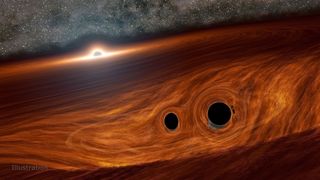
'Not so exotic anymore': The James Webb telescope is unraveling the truth about the universe's first black holes
By Jonas Enander published
A peculiar object discovered by the James Webb Space Telescope just 700 million years after the Big Bang could reveal the origins of the earliest black holes in the universe, some experts say.
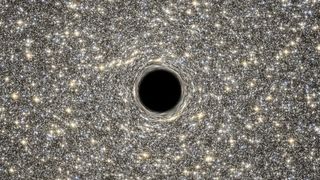
'Torn apart by the darkness': What would happen if a human fell into a black hole?
By Jonas Enander published
What would a human see and feel while falling into a black hole? In this exclusive excerpt of his new book, "Facing Infinity," author and astrophysicist Jonas Enander tells us in terrifying detail.
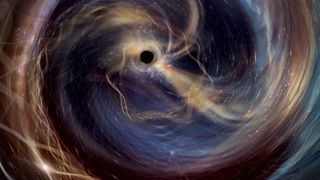
Physicists detect rare 'second-generation' black holes that prove Einstein right... again
By Elizabeth Howell published
Physicists have analyzed two enormous black hole mergers that happened one month apart and have come up with tantalizing evidence that rare "second-generation" black holes were involved.
Get the world’s most fascinating discoveries delivered straight to your inbox.


